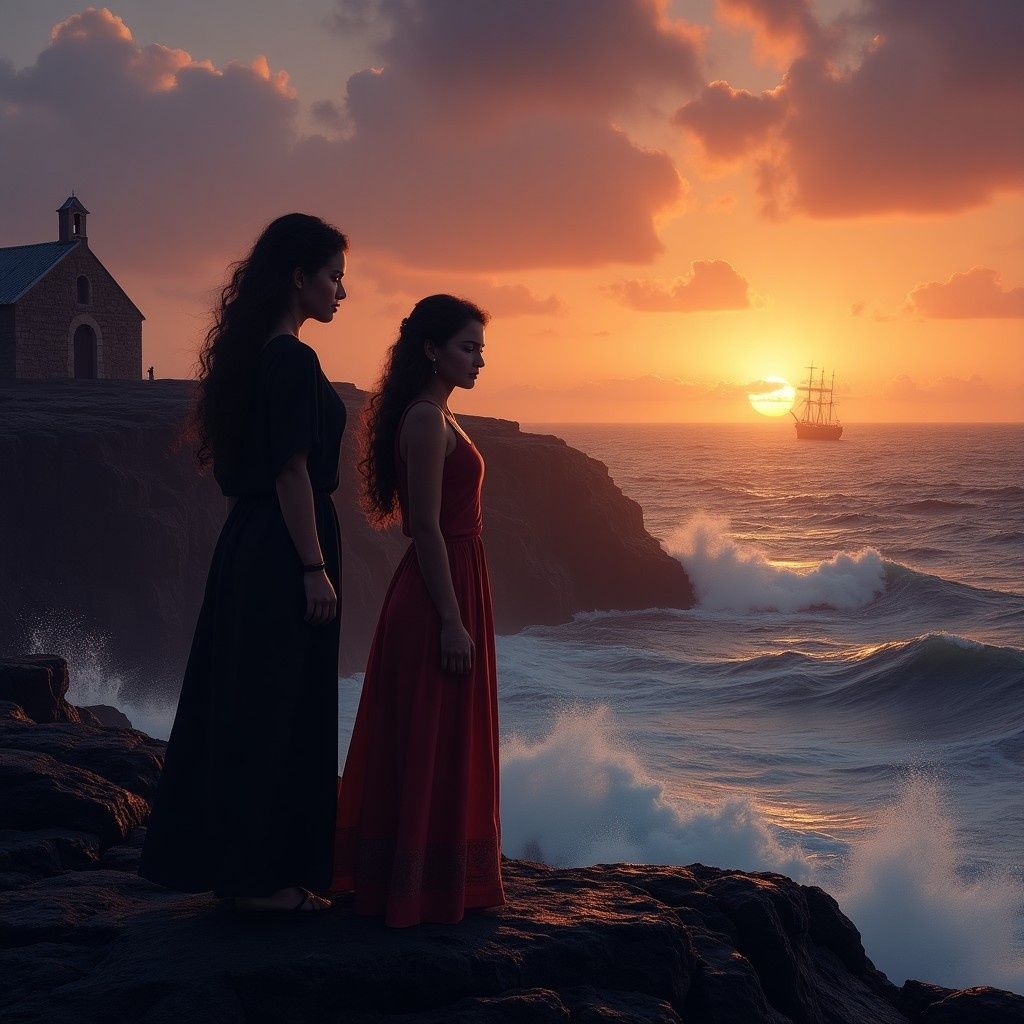The salty breeze swept over the rocky shores of Lanzarote, carrying with it the cries of seagulls and the distant murmur of the Atlantic.

In the heart of the island, beneath the shade of a lone palm, sat a young woman named Elvira. Her eyes, dark as the volcanic soil, were fixed on the horizon, where the sun dipped its golden fingers into the sea. Elvira's heart was a storm of emotions. Her people, the Guanches, had known peace on these islands for generations, living in harmony with the land and sea. But now, whispers of foreign ships and men with eyes like the sky had reached their ears. These men, from lands called Portugal and Castile, brought with them chains and cruelty, tearing families apart and casting them into a life of bondage. It was Bishop Fernando Calvetos who had first raised his voice against this injustice. A man of the cloth, yet with a heart that beat fiercely for the oppressed, he had traveled to Rome, pleading with the Holy Father to intervene. His words, laden with the weight of his people's suffering, had moved Pope Eugene IV to issue the papal bull "Sicut dudum."

Elvira had heard the bishop speak of it, his voice echoing through the stone halls of the island's small church. "No Christian should be enslaved," he had declared, his eyes burning with conviction. "The Holy Father has decreed it so." Yet, as Elvira watched the waves crash against the shore, she knew that words alone could not break chains. The island was still under the shadow of fear, as the foreign powers bickered over their claim to the land, their greed overshadowing the papal decree. Her thoughts were interrupted by the sound of footsteps on the path. It was Mateo, a young man whose spirit was as fiery as the island's sun. He approached with a determined stride, his presence a beacon of hope amidst the encroaching darkness.

"Elvira," he called, his voice steady, "the bishop has gathered the elders. He believes there is a way to ensure the bull is enforced." She rose to meet him, her heart lifting at the prospect of action. "What can we do?" she asked, her voice a blend of hope and trepidation. Mateo's eyes, filled with resolve, met hers. "We must stand together, as one people. The bishop has sent word to Rome, urging them to send envoys to witness our plight. We must show them our strength, our unity." As the sun dipped below the horizon, casting the world in shades of purple and gold, Elvira felt a flicker of hope ignite within her. The path ahead was fraught with danger, but she knew that with courage and unity, they could reclaim their freedom. The days that followed were a blur of activity. The islanders, inspired by the bishop's unwavering faith, gathered in the village square, their voices rising in a chorus of defiance. They would not be silenced, nor would they be broken. And so, when the envoys from Rome arrived, they found a people united, their spirits unyielding. The papal bull, once just words on parchment, became a rallying cry for justice and freedom. Though the political tides would shift, and the powers of Europe would continue their dance of conquest, the spirit of the Guanches remained unbroken. In the face of adversity, they had found their strength, their voices echoing across the waves, a testament to their resilience and their unyielding hope for a future free from chains. In the quiet moments, as Elvira stood once more by the shore, she knew that their fight was far from over. But she also knew that they were not alone. The world was changing, and with it, the promise of a new dawn.

In the heart of the island, beneath the shade of a lone palm, sat a young woman named Elvira. Her eyes, dark as the volcanic soil, were fixed on the horizon, where the sun dipped its golden fingers into the sea. Elvira's heart was a storm of emotions. Her people, the Guanches, had known peace on these islands for generations, living in harmony with the land and sea. But now, whispers of foreign ships and men with eyes like the sky had reached their ears. These men, from lands called Portugal and Castile, brought with them chains and cruelty, tearing families apart and casting them into a life of bondage. It was Bishop Fernando Calvetos who had first raised his voice against this injustice. A man of the cloth, yet with a heart that beat fiercely for the oppressed, he had traveled to Rome, pleading with the Holy Father to intervene. His words, laden with the weight of his people's suffering, had moved Pope Eugene IV to issue the papal bull "Sicut dudum."

Elvira had heard the bishop speak of it, his voice echoing through the stone halls of the island's small church. "No Christian should be enslaved," he had declared, his eyes burning with conviction. "The Holy Father has decreed it so." Yet, as Elvira watched the waves crash against the shore, she knew that words alone could not break chains. The island was still under the shadow of fear, as the foreign powers bickered over their claim to the land, their greed overshadowing the papal decree. Her thoughts were interrupted by the sound of footsteps on the path. It was Mateo, a young man whose spirit was as fiery as the island's sun. He approached with a determined stride, his presence a beacon of hope amidst the encroaching darkness.

"Elvira," he called, his voice steady, "the bishop has gathered the elders. He believes there is a way to ensure the bull is enforced." She rose to meet him, her heart lifting at the prospect of action. "What can we do?" she asked, her voice a blend of hope and trepidation. Mateo's eyes, filled with resolve, met hers. "We must stand together, as one people. The bishop has sent word to Rome, urging them to send envoys to witness our plight. We must show them our strength, our unity." As the sun dipped below the horizon, casting the world in shades of purple and gold, Elvira felt a flicker of hope ignite within her. The path ahead was fraught with danger, but she knew that with courage and unity, they could reclaim their freedom. The days that followed were a blur of activity. The islanders, inspired by the bishop's unwavering faith, gathered in the village square, their voices rising in a chorus of defiance. They would not be silenced, nor would they be broken. And so, when the envoys from Rome arrived, they found a people united, their spirits unyielding. The papal bull, once just words on parchment, became a rallying cry for justice and freedom. Though the political tides would shift, and the powers of Europe would continue their dance of conquest, the spirit of the Guanches remained unbroken. In the face of adversity, they had found their strength, their voices echoing across the waves, a testament to their resilience and their unyielding hope for a future free from chains. In the quiet moments, as Elvira stood once more by the shore, she knew that their fight was far from over. But she also knew that they were not alone. The world was changing, and with it, the promise of a new dawn.
The papal bull "Sicut dudum," issued by Pope Eugene IV on January 13, 1435, was a significant early condemnation of slavery, specifically targeting the enslavement of converted Christians in the Canary Islands. Prompted by complaints from Bishop Fernando Calvetos, the bull ordered the immediate release of enslaved natives, threatening excommunication for non-compliance. This directive came amidst territorial disputes between Portugal and Castile, with both engaging in slave raids. Despite the bull's initial impact, political pressures led to subsequent papal concessions, allowing Portugal to conquer non-Christian parts of the islands. "Sicut dudum" is notable for its early stance against slavery, predating European encounters with the New World by sixty years.


Comments
Post a Comment